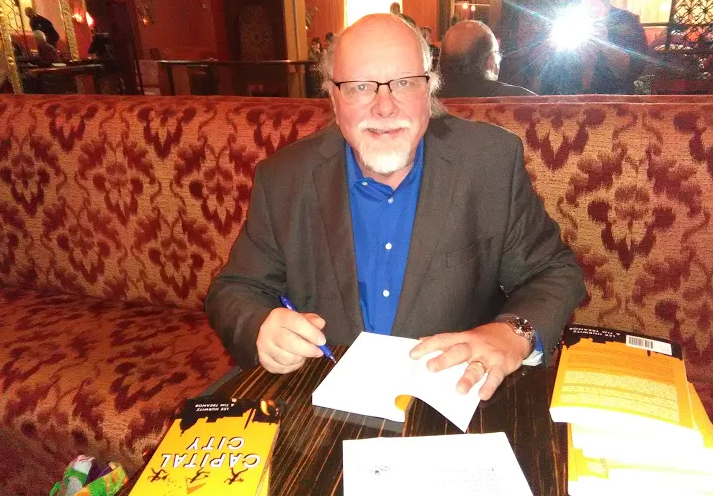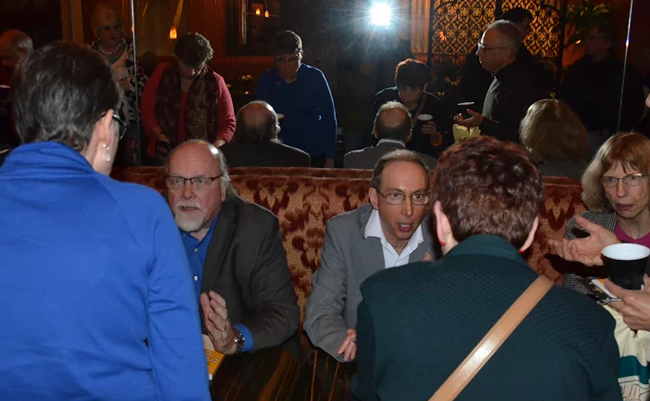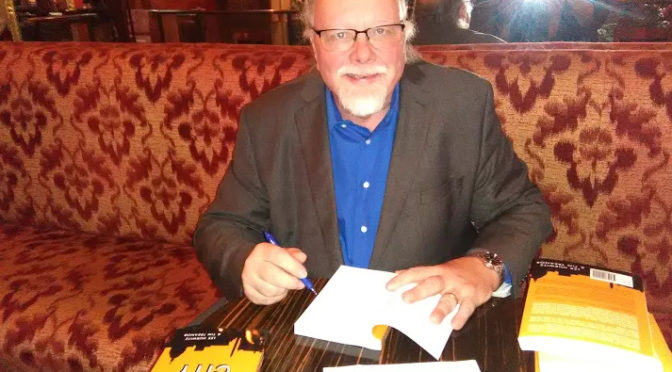Here’s what you believe, if you’re like me: the day you become a published author — Published! Author! by a real Publishing House! — your life is transformed. You are no longer an ordinary schmoe, covering the town council meeting in Hamden or Hampton or wherever, or pulling over guys with busted taillights, or sweating over legal briefs. You are instead both a celebrity and a sage, the moral and intellectual equivalent (and financial!) of Stephen King, or Nabokov or — what the hell — Tolstoy.

Your life is unbelievably cool. You start the day on the Today show, interviewed by Matt Lauer, who throws softball questions. (Where do you get your stories? Who is your inspiration?). Then a brief stopover at Columbia University, where you give a (widely-attended) seminar on “How to Write Like Me.” Then, it’s on to Los Angeles, where Spielberg is doing a treatment of your novel. And then early to bed, because tomorrow you go to Sweden, where the King is going to give you something very nice.
Alas and goddamn, that’s not how it is. Your everyday life does not go away; you still have to do the laundry, stand and sway on the Metro and, I’m sorry to have to report, take out the garbage. The change is subtle, and to an extent of your own making. It’s still worth it.
What happens when a publishing house selects your novel for publication is that you suddenly find out that your writing is worth a damn. Or, more specifically, worth at least a thousand dollars, which is the typical advance for a newly-published writer. “I’m a hundredaire!” I shouted when I got my first advance (I had an agent and a collaborator).
This is different from when you forced your literary efforts on your friends and relatives, most of whom value their relationship with you more than they esteem their functions as literary critics. (“That’s very compelling, dear. Now take out the garbage.”) It is different from when you put fan fiction for free on the Internet (where you learned how many people opened your story, but not how many closed it after the first paragraph).
But: how far does it go? In the days of Hemingway and Faulkner, publishers would pant after the unpublished novelist who could bring a spark of unvarnished genius from the rough-hewn heart of the heartland. Was the manuscript stained with tobacco juice, and full of misspellings, bad English and ventures into incoherence? It is of no matter, since publishers had brilliant editors standing by, ready to polish that rough stone into diamond.
This is not so much the case today. You must polish your manuscript yourself, and be prepared to represent it before the public. The publisher will make a book out of it, and distribute it, but unless you are a successful author or a celebrity, or your book appeals to a lucrative market, you should expect to shoulder your share of the marketing. (Incidentally, here is the best book title ever: “Eat Cake and Grow Thin, by Oprah Winfrey.”)
And so, in that behalf, I found myself preparing for a book launch party at Mama Ayesha’s last Saturday night — a restaurant in Northwest Washington specializing in Middle Eastern food and literary events. The food included chicken and veggie kabobs, grape leaves, baklava and an endless supply of Prosecco. My co-author, Lee Hurwitz, and I were the literary event.

I dressed — well, not to the nines, that would have been pretentious, but to the sevens, in a grey suit and a deep blue open-collar shirt. Lee took on a somewhat more rumpled look, like the college professor he is, when his time permits. I got there around four, about an hour early, so that everyone at the restaurant could see what a Published Author looks like. The exterior wall features a mural with every President from Eisenhower to Obama, with Mama Ayesha herself standing in the middle of them. I wondered if it might be appropriate for the Presidents to be joined by a Published Author or two, just for variety.
“I’m glad you’re here,” my agent, the fabulous Diane Nine, said. “These tables need to be moved.”
I had been at a book-signing event before, at the DC literary institution Politics and Prose Bookstore. The book-signer was former President Jimmy Carter (he’s on the wall), who had just written a novel. There were about a thousand people and, because it was December, I was wearing a heavy overcoat. It was approximately the temperature of Nairobi in the bookstore. By the time I got to the former President, I was a big ol’ pile of sweaty goo.
We exchanged pleasantries while Carter signed the book. When he looked up at me he said, “you look hot.”
And all I could think of was Jimmy Carter’s coming on to me. “Thank you, Mr. President,” I gulped. “You look hot, too.”
I was so embarrassed I wanted to arrest myself and lead myself out of the bookstore in handcuffs. I resolved not to tell anyone seeking a signed copy of our book that he looked hot.
The guests started rolling in at five, and I reviewed my most current nightmare. In it, no one would buy the book, no one would ask me to sign it, and no one would talk to me. Instead, they would eat up all the food and slam down all the Prosecco, so that there was none left for me.
But it wasn’t like that at all. People rolled up to the sales table — operated by Sue, a delightful sales executive from Politics and Prose — bought a copy, and then brought it over to us for signing. And, one by one, I learned their stories.
There was the woman who had just retired from her job at the Library of Congress, so that she could volunteer as a librarian at the Arlington Public Library.
There was the high school English teacher, who had taught Shakespeare to 12th graders for many years but who had also retired this year. She missed it so much, she said, even though she had left only last June.
There was the lawyer who holds a profoundly responsible position in the bankruptcy court system. He had to leave early to return to work, although it was Saturday evening in the middle of a three-day weekend.
There was the man who designed the safety barriers commonly in use in Pennsylvania.
There was the grizzled man who demanded to know which one of us had worked in DC City Government (the novel involves City government folks). It was Lee, I told him.
There was Jolene Sugarbaker, the Trailer Park Queen, who specializes in cheap but surprisingly healthy and tasty recipes and is in all other respects rather astonishing.
There was a woman who works in end-of-life care, and who seemed indefatigably cheerful. She double-parked to buy the book and get our signatures.
There was the journalist who covered the Middle East for over thirty years, including the two wars in Iraq. Lorraine, my dear bride, asked him what he thought of today’s journalism. “Walter Cronkite is spinning in his grave,” he muttered.
“It was like an evening of ten-minute plays,” Lorraine said as we drove off, and I realized that she was right. The guests had eaten all the food and drunk all the Prosecco, but that was all right. We had sold and signed a lot of books, and, even better, heard a lot of stories.
And that’s when I realized it. Capital City is a damn good story, if I do say so myself. But within any given room there are dozens of other stories, and they are each also good.
So that’s the answer to Matt Lauer’s imagined softball question. Where do I get my stories? I get them from you.

